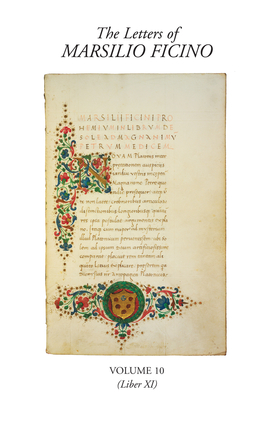Overview
These volumes contain the first English translation of the corpus of letters published during the lifetime of the philosopher priest who helped to shape the Renaissance worldview. The letters in this volume span just seventeen months, from 13th April, 1491 to 13th September, 1492. This period marked a critical time for the whole of Florence, occasioned by the death of Lorenzo de' Medici, effective ruler of the city for more than two decades. The youth and inexperience of his son and successor, Piero, led to discontent and instability, a situation that would soon be exploited by the radical reforming friar, Girolamo Savonarola. On the other hand it was a period of prolific creativity in literature and the arts, described by Ficino as a "golden age". 1491 saw the publication of important works in philosophy by Pico della Mirandola and in philology by Poliziano. Ficino himself brought out his great Plotinus translation with the commentary that had occupied him for several years. His next major task lay in translating works of Dionysius, the short Mystical Theology and the much longer Divine Names. He also sent copies of some fascinating minor texts he had explored to his friends, including extracts from newly discovered writings of Proclus on Plato's Republic and Alcibiades I . A particular feature of this volume is Ficino's German correspondence.Reviews
"Such giants as Ficino deserve a wider audience." —Umberto Eco
"From every point of view it is a pleasure to read this perfect introduction to one of the most attractive and influential figures of the Italian Renaissance." —C.V. Wedgwood in The Daily Telegraph
"Marsilio Ficino (1433-1499) was at the very fountainhead of some of the most characteristic and influential aspects of the Italian Renaissance." —C.B. Schmitt in The Times Literary Supplement
"...so well translated, so well annotated and so beautifully produced that it is a pleasure to read and possess." —A. Hamilton, Heythrop Journal
"Undoubtedly these letters comprise one of the "spiritual classics" of the past thousand years." —Christopher Booker, The Spectator
"All that we regard as the norm of Western European art—Botticelli's paintings, Monteverdi's music, Shakespeare's philosophical lovers, Berowne and Lorenzo, Jacques and Portia—has flowered from Ficino's Florence." —Kathleen Raine, The Times
"It is almost a miracle to find the recent tenth volume in this ambitious and important project of providing English translations to Marsilio Ficino's letters . . . this volume is an example of the high scholarly standards essential to the humanities." —Amos Edelheit, Renaissance Quarterly
"In the last two decades or so it has become very difficult to keep high scholarly standards in the humanities . . . In such circumstances it is almost a miracle to find the recent tenth volume in this ambitious and important project of providing English translations to Marsilio Ficino's letters, containing book 11 of Ficino's letters . . .  All in all this volume is an example of the high scholarly standards essential to the humanities." —Amos Edelheit, Renaissance QuarterlyAuthor Biography
Arthur Farndell has been a member of the team of scholars at the School of Economic Science in London for more than 35 years. He is also the translator of many of Marsilio Ficino's commentaries on Plato's Dialogues, which have been published in four volumes as All Things Natural, Evermore Shall Be So, Gardens of Philosophy, and When Philosophers Rule.

